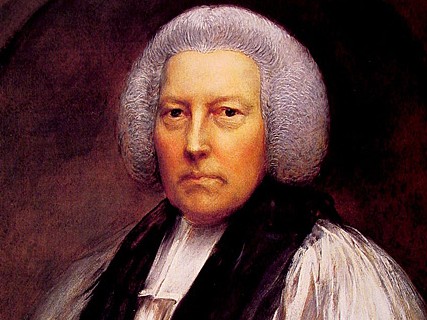
English divine and writer, bishop of Worcester, was born at Congreve, in the parish of Penkridge, Staffordshire, on the 13th of January 1720, where his father was a farmer. He was the second of three children of John and Hannah Hurd and was educated at "a good Grammar school at Brewood". On the 3rd October 1733 he was admitted to Emanuel College, Cambridge but did not go up until he matriculated in 1735. He took his BA in 1739 and was ordained Deacon (title: Reymerston, Norfolk) on the 13th June 1742 at St Paul's Cathedral by Joseph Butler, Bishop of Bristol. Made MA in July 1742 and in December that year was elected to a Fellowship.
In 1748 he published 'Some Remarks on an Enquiry into the Rejection of Christian Miracles by the Heathens' (1746), by William Weston, a fellow of St Johns College, Cambridge. He prepared editions of the Ars poelica, Epistola ad Pisones (1749), and the Epistola ad Augustum (1751) of Horace, which won the praise of Edward Gibbon. A compliment in the preface to the edition of 1749 was the starting-point of a lasting friendship with William Warburton, through whose influence he was appointed one of the preachers at Whitehall in 1750.
In 1765 he was elected to the Preachership of Lincoln's Inn which entitled him to chambers and board in the Inn with the requirement that he should preach each Sunday in term. In 1767 he became Archdeacon of Gloucester.
In 1768 he delivered at Lincoln's Inn the first Warburton lectures, which were published later (1772) as 'An Introduction to the Study of the Prophecies concerning the Christian Church'. He became bishop of Lichfield and Coventry in 1774, and two years later was selected to be tutor to the prince of Wales and the duke of York. In 1781 he was translated to the see of Worcester. He lived chiefly at Hartlebury Castle, where he built a fine library, to which he transferred Alexander Pope's and Warburton's books, purchased on the latter's death. He was extremely popular at court, and in 1783, on the death of Archbishop Cornwallis, the king pressed him to accept the primacy, but Hurd, who was known, says Madame d'Arblay, as 'The Beauty of Holiness', declined it as a charge not suited to his temper and talents, and much too heavy for him to sustain. He died, unmarried, on the 28th of May 1808.
Hurds' Letters on Chivalry and Romance' (1762) retain a certain interest for their importance in the history of the Romantic Movement, which they did something to stimulate. They were written in continuation of a dialogue on the age of Queen Elizabeth included in his 'Moral and Political Dialogues' (1759). Two later dialogues 'On the Uses of Foreign Travel' were printed in 1763. Hurd wrote two acrimonious defences of Warburton 'On the Delicacy of Friendship' (1755), in answer to Dr J. Jortin, and a letter (1764) to Dr Thomas Leland, who had criticized Warburton's 'Doctrine of Grace'. He edited 'The Works of William Warburton', the 'Selected Works of Abraham Cowley', (1772) and left materials for an edition (6 vols., 1811) on Addison. His own works appeared in a collected edition in 8 vols.
Opinions about him differed. For some he was an illustrious ornament of his Church. Horace Walpole called him a 'servile pedant', and David Hume had some uncomplimentary things to say about him. Yet he was George III's favourite bishop and much valued by him as a friend. Beilby Porteus always held him in high regard.